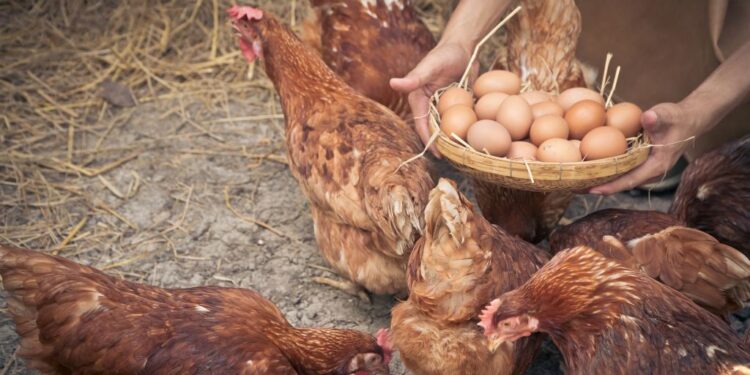As a backyard chicken keeper or prepper, ensuring you get the most out of your eggs is important. One of the most common questions among chicken owners is how long can chicken eggs stay in the coop before they should be harvested? The timing of collecting eggs can affect their freshness, safety, and overall quality. In this article, we’ll break down the factors that influence egg collection, how long eggs can safely sit in the coop, and best practices for harvesting eggs.
The Freshness of Eggs: Why Timely Harvesting is Crucial
Eggs are a fantastic source of protein and are a staple in many prepper’s food storage plans. The longer an egg stays in the coop, the more likely it is to deteriorate. This is why it is so important to know how long can chicken eggs stay in the coop before harvesting. Eggs are perishable and if they sit too long, they can become less fresh and potentially unsafe to consume. Eggs that are left in the coop too long can also be at risk of being eaten by predators or exposed to bacteria, so timing is key.
Related: DIY Chicken Tunnel (Step-by-Step Guide)
How Long Can Chicken Eggs Stay in the Coop Before Harvesting?
 In general, eggs can stay in the coop for up to 7 days before they should be collected. After this period, eggs may start to degrade in quality. However, the exact timeframe depends on several factors, including temperature, humidity, and the overall environment of your coop.
In general, eggs can stay in the coop for up to 7 days before they should be collected. After this period, eggs may start to degrade in quality. However, the exact timeframe depends on several factors, including temperature, humidity, and the overall environment of your coop.
-
Room Temperature vs. Refrigeration: If you are in a warm climate or your chickens’ coop is kept warm, eggs will spoil faster than if stored in cooler conditions. At room temperature (around 60–70°F or 15–21°C), eggs should be collected daily to ensure they stay fresh. If eggs are not harvested and left in a warm environment for too long, they may start to lose their freshness quickly, and bacteria could begin to grow on the eggshell.
On the other hand, in colder weather, eggs can stay in the coop longer, sometimes up to 1–2 weeks before collection, especially if the temperature remains below 40°F (4°C). However, most chicken keepers recommend collecting eggs daily or at least every other day for the best quality.
-
Humidity: High humidity in the coop can also speed up the degradation of eggs. If there’s excess moisture, eggs may lose their protective coating, making them more prone to bacteria. Keeping the coop dry and well-ventilated helps to maintain egg quality for a longer time.
-
Age of the Egg: Freshly laid eggs are best when collected within a day or two. After a couple of days, the egg’s protective coating (known as the bloom) starts to degrade. This protective layer helps prevent bacteria from entering the egg. As time passes, the eggshell becomes more porous, allowing bacteria and other pathogens to enter. If you’re planning on storing eggs long-term, refrigeration is recommended, but the sooner you collect them, the better.
Signs That an Egg Has Been Left Too Long in the Coop
Sometimes, life gets busy and eggs can stay in the coop longer than expected. So how can you tell if an egg is still safe to eat? There are a few easy tests to determine the freshness of an egg:
-
The Float Test: One of the easiest and most effective ways to check an egg’s freshness is the float test. Fill a bowl with water and gently place the egg inside. A fresh egg will sink to the bottom and lie flat on its side. If the egg stands upright or floats to the top, it’s no longer fresh and should be discarded. This happens because as an egg ages, the air cell inside it enlarges, making it buoyant.
-
The Smell Test: If you crack the egg open and notice a foul smell, it’s best to throw it away. A rotten egg will have a strong sulfur-like odor, and it should not be consumed. This is one of the clearest signs that the egg has gone bad.
-
Visual Inspection: Another sign that an egg has aged beyond its prime is a discolored egg white or yolk. If you notice any changes in color, especially a green or blackish tint, discard the egg. It could be a sign of bacterial growth.
Related: Ingenious Ideas for Taking Care of Your Chickens
How to Keep Eggs Fresh in the Coop
If you’re concerned about collecting eggs too late, here are some tips to help keep your eggs fresh:
-
Install Nest Boxes with Covers: Ensure that your chickens have accessible and comfortable nest boxes where they can lay eggs. If your chickens are laying in the open or in areas where eggs are exposed to sunlight, they will degrade faster. Providing covered, dark spaces helps keep eggs cool and protected.
-
Check for Eggs Daily: Aim to check for eggs at least once a day to ensure you’re not leaving them behind for too long. If you are unable to collect eggs daily, consider having someone check in for you or create a daily routine to collect them at the same time every day.
-
Egg Cartons or Containers: Once eggs are harvested, store them in an egg carton or plastic container with the pointy end facing down. This helps to preserve freshness and prevent the yolk from breaking. Store the eggs in a cool place, ideally in a refrigerator, to extend their shelf life.
-
Consider Refrigeration: If you’re storing eggs for a longer period, consider refrigerating them to extend freshness. Refrigeration will slow down the degradation process and keep eggs fresh for up to three weeks or even longer.
Conclusion
In conclusion, while chicken eggs are a fantastic food source, it’s important to harvest them at the right time. Now you know how long can chicken eggs stay in the coop before harvesting. Eggs should ideally be collected daily or at least every other day, depending on the temperature and humidity in your coop. The fresher the egg, the better the quality and safety for consumption. Make sure to store eggs properly, either by refrigerating them or placing them in a cool, dry place to extend their shelf life. Regular egg collection and proper handling will ensure that your eggs are always fresh and safe for consumption, which is vital for maintaining a healthy food supply, especially during an emergency or crisis situation.
You May Also Like:
 Chicken Secrets Nobody Told You About
Chicken Secrets Nobody Told You About
Learn How to Make Each Hen Lay More Than 300 Eggs per Year ( Video)














